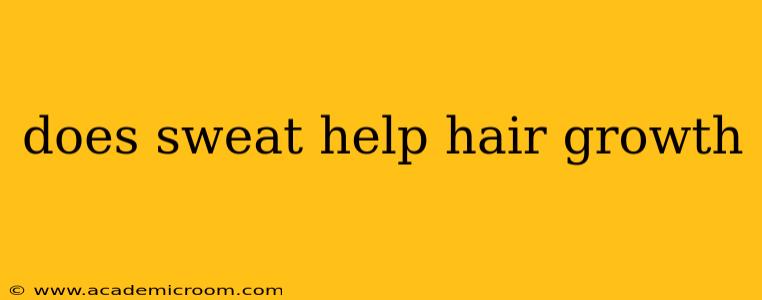Does Sweat Help Hair Growth? Unpacking the Truth About Sweat and Scalp Health
The relationship between sweat and hair growth is a fascinating one, often sparking curiosity and leading to many questions. While the idea of sweat directly stimulating hair follicles might seem far-fetched, the truth is a bit more nuanced. This article will delve into the science behind sweat and its impact (or lack thereof) on hair growth, addressing common queries along the way.
What is the connection between sweat and hair follicles?
Sweat itself doesn't directly promote hair growth. Sweat is primarily composed of water, electrolytes, and small amounts of urea and other waste products. These components don't possess inherent properties that stimulate hair follicle activity. However, the process of sweating and its impact on the scalp's environment plays a more significant role.
Does sweating cleanse the scalp and improve hair health?
This is a common question, and the answer is partially yes. Sweating can help to remove dirt, oil, and product buildup from the scalp. This cleansing action can create a healthier environment for hair follicles to thrive, indirectly supporting hair growth. A clean scalp is less prone to infections and inflammation, which can hinder hair growth. However, it's important to note that sweating alone isn't enough for thorough cleansing. Regular washing with a suitable shampoo is still crucial for optimal scalp hygiene.
Can excessive sweating harm hair growth?
Excessive sweating, while potentially beneficial in removing some impurities, can also be detrimental to hair health. The constant moisture can create a breeding ground for bacteria and fungi, leading to scalp conditions like dandruff and seborrheic dermatitis. These conditions can inflame the scalp, potentially disrupting the hair growth cycle and leading to hair loss or thinning.
Does sweat contain any nutrients beneficial for hair growth?
Sweat doesn't contain a significant amount of nutrients directly beneficial for hair growth. While sweat contains trace amounts of minerals like sodium and potassium, these are not in concentrations sufficient to impact hair follicle function. For optimal hair growth, a balanced diet rich in essential vitamins, minerals, and proteins is far more crucial.
Can certain sweat components affect hair follicle function?
While sweat itself doesn't directly stimulate hair growth, some of its components could indirectly influence follicle function. For example, the presence of urea, a waste product, might, in small quantities, have a slight moisturizing effect on the scalp. However, this is not a significant factor compared to proper hydration and scalp care.
What's the best way to maintain scalp hygiene?
The key to a healthy scalp and optimal hair growth lies in a combination of factors:
- Regular washing: Wash your hair regularly with a gentle shampoo suited to your hair type.
- Conditioning: Use a conditioner to keep your hair and scalp hydrated.
- Healthy diet: A balanced diet rich in vitamins, minerals, and proteins is essential.
- Stress management: Stress can negatively affect hair growth. Practice stress-reducing techniques like exercise or meditation.
In conclusion, while sweating can indirectly contribute to a healthier scalp environment by removing impurities, it's not a direct stimulant of hair growth. A holistic approach to scalp and hair care, involving proper cleansing, a nutritious diet, and stress management, is far more effective in promoting healthy, strong hair growth. If you're experiencing hair loss or thinning, consulting a dermatologist or trichologist is recommended to rule out underlying medical conditions.
